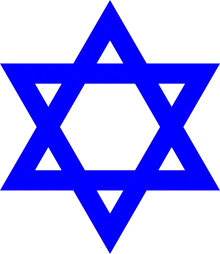Prophets in Judaism
According to Rashi, there were 48 prophets and 7 prophetesses of Judaism.[1] The last Jewish prophet is believed to have been Malachi. In Jewish tradition it is believed that the period of prophecy, called Nevuah, ended with Haggai, Zechariah, and Malachi at which time the "Shechinah departed from Israel".[2][3]
| Part of a series on |
| Jews and Judaism |
|---|
 |
|
Prophets of the Most High
According to the Talmud, there were 48 prophets and seven prophetesses.[4][1]
The 48 prophets of the Most High
- Abraham
- Isaac
- Jacob
- Moses
- Aaron
- Joshua
- Phineas
- Elkanah
- Eli
- Samuel (Shmu'el שמואל)
- Gad
- Nathan
- David
- Solomon
- Iddo
- Michaiah son of Imlah
- Obadiah or Ovadyah [עובדיה]
- Ahijah the Shilonite
- Jehu son of Hanani
- Azariah son of Oded
- Jahaziel the Levite
- Eliezer son of Dodavahu
- Hosea or Hoshea [הושע]
- Amos [עמוס]
- Micah the Morashtite or Mikhah [מיכה]
- Amoz
- Elijah
- Elisha
- Jonah son of Amittai or Yonah [יונה]
- Isaiah (Yeshayahu [ישעיהו])
- Joel or Yo'el [יואל]
- Nahum or Nachum [נחום]
- Habakkuk or Habaquq [חבקוק]
- Zephaniah or Tsefania [צפניה]
- Uriah
- Jeremiah
- Ezekiel
- Shemaiah
- Baruch
- Neriah
- Seraiah
- Mehseiah
- Haggai [חגי]
- Zechariah Zekharia [זכריה]
- Malachi or Malakhi [מלאכי]
- Mordecai Bilshan
- Oded
- Hanani
Many more prophets in the era of prophecy
Although the Talmud states that only “48 prophets and 7 prophetesses prophesied to Israel”,[5] it does not mean that there were only 55 prophets. The Talmud there challenges this with other examples, and concludes by citing a Baraita tradition that the number of prophets in the era of prophecy was double the number of Israelites who left Egypt (600,000 males). The 55 prophets are recorded, because they said prophecies that have eternal relevance for future generations and not just for their own generation, or own ecstatic encounter with God.[6][7] Hebrew scripture makes references to groups of such ecstatic prophets, for example concerning King Saul:
10 And when they came thither to the hill, behold, a band of prophets met him; and the spirit of God came mightily upon him, and he prophesied among them. 11 And it came to pass, when all that knew him beforetime saw that, behold, he prophesied with the prophets, then the people said one to another: ‘What is this that is come unto the son of Kish? Is Saul also among the prophets?’ 12 And one of the same place answered and said: ‘And who is their father?’ Therefore it became a proverb: ‘Is Saul also among the prophets?’ 13 And when he had made an end of prophesying, he came to the high place.[8]
See also
References
- Scherman, Nosson. The Stone Edition Tanach. Mesorah Publications, Limited. p. 2038.
- A Dictionary of the Jewish-Christian Dialogue, Paulist Press (1995), p167.
- Light of Prophecy Union of Orthodox Jewish Congregations of America/National Conference of Synagogue Youth (1990), p6.
- Megillah 14a and glosses ad loc.
- Talmud, Tractate Megillah 14a
- Why Isn’t the Book of Daniel Part of the Prophets? from Chabad.org, footnote 2
- Talmud Megilla 14a
- 1 Samuel 10-13
External links
- Prophets and Prophetesses of Israel concise tabulated information: name in Hebrew, chronology, Biblical passage, accomplishments.